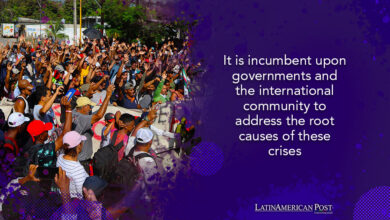Juanita Castro’s Legacy: A Renewed Call to Oppose Cuba’s Regime
The recent passing of Juanita Castro, a fervent critic of Cuba's regime, underscores the need to continue challenging Havana's authoritarian rule, a struggle that seems to have lost momentum in recent years.

Photo: EFE/ Gastón De Cárdenas ARCHIVE (Edit: Latampost)
The Latin American Post Staff
Escucha este artículo
Leer en español: El legado de Juanita Castro: un llamado renovado a oponerse al régimen de Cuba
Defiance in Exile: Juanita Castro's Legacy
The death of Juanita Castro, the anti-communist sister of Fidel and Raúl Castro, in Miami at age 90 not only marks the end of an era but also serves as a poignant reminder of the unfinished business in the fight against Cuba's authoritarian regime. Juanita, a figure who lived in the shadow of her notorious brothers yet carved out her own path as a dissident, represents a critical voice that has long challenged the oppressive system in Havana. Her passing is a clarion call for us to reinvigorate our efforts in opposing a regime that continues to curtail freedoms and human rights.
Juanita's story is a testament to the complexities and contradictions of the struggle against Cuba's communist regime. Born into a family synonymous with Cuban politics, she initially supported the Revolution against Fulgencio Batista. However, her early disillusionment and subsequent defection in the 1960s signified a stark opposition to the political persecution and strict ideological adherence demanded by Fidel Castro's government.
Exile and Activism: Juanita's Relentless Pursuit
Her life in exile, especially in the United States, was marked by activism and a relentless pursuit of freedom for her homeland. Juanita's involvement with the CIA and her support for dissidents were indicative of her unwavering commitment to the cause. This commitment was so profound that it eclipsed familial ties, leading to decades of estrangement from her brothers.
Juanita's struggle is emblematic of the broader fight against authoritarianism in Cuba. For too long, the international community has wavered in its response to the human rights violations and suppression of dissent in Cuba. The thawing of relations, especially during the Obama administration, promised a new chapter. However, the subsequent years have shown that engagement alone is insufficient in compelling the Cuban regime to implement meaningful reforms.
Protests and Global Spotlight: Renewed Attention on Cuba's Issues
The recent protests in Cuba, sparked by economic crises and exacerbated by the pandemic, have brought the nation's deep-seated issues back into the global spotlight. These protests indicate the spirit of resistance against the regime is alive within the Cuban population. However, the international response has been tepid, with democratic nations failing to pressure Havana to enact change.
This is where the legacy of Juanita Castro becomes crucial. Her life reminds us that fighting for freedom and democracy is often a long and arduous journey. Juanita's example should inspire us to renew our efforts in supporting the Cuban people's quest for liberation from an oppressive regime. This means not only vocalizing our support for democratic movements within Cuba but also implementing policies that pressure the Cuban government to respect human rights and embrace democratic reforms.
Solidarity and Sacrifice: Juanita's Example
Moreover, Juanita's story highlights the importance of solidarity with those who oppose authoritarian regimes, regardless of their familial connections or past. Her courage in standing against her brothers' regime underscores the moral imperative to support those who fight for democratic values, even when it involves personal sacrifice.
Also read:Forging Much-Needed Unity for Prosperity at the APEP Summit
Juanita's passing also serves as a reminder of the resilience of the Cuban diaspora. This community, which has consistently advocated for freedom in Cuba, must be at the forefront of the renewed push against the regime. Their experiences, insights, and unwavering commitment to their homeland are invaluable in shaping an effective strategy to change Cuba.
In conclusion, while Juanita Castro's death may symbolize the end of a direct familial link to the Cuban regime, it should not signify the end of the opposition to it. Instead, her life and legacy should energize us to continue the fight against authoritarianism in Cuba. The path to freedom and democracy is fraught with challenges. Still, it is a path worth pursuing with renewed vigor and determination. Juanita Castro's life serves as a beacon, guiding us in this ongoing struggle for the soul of Cuba.




